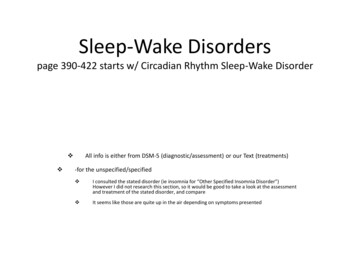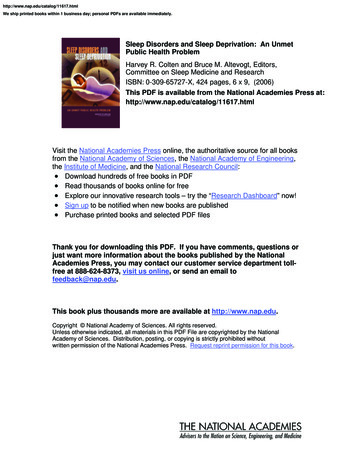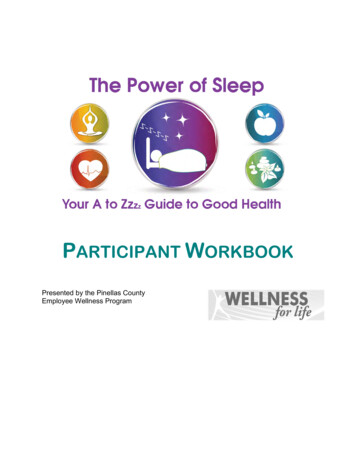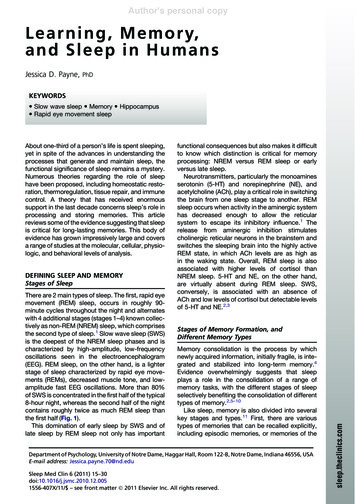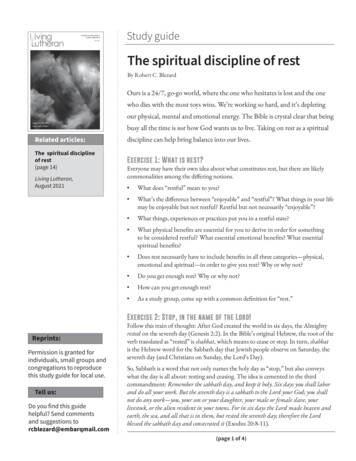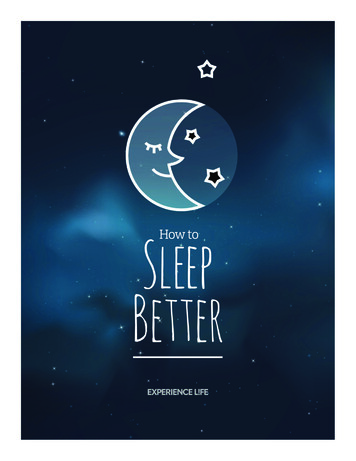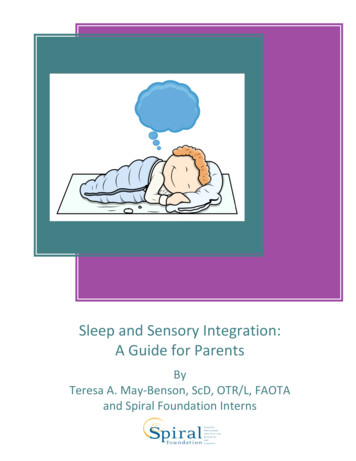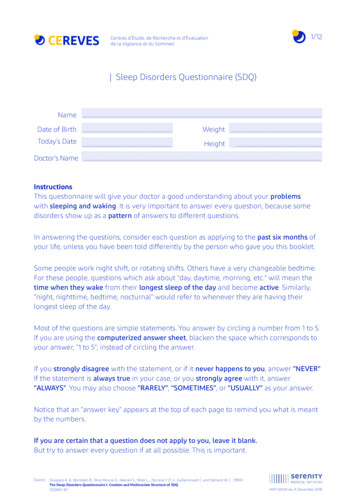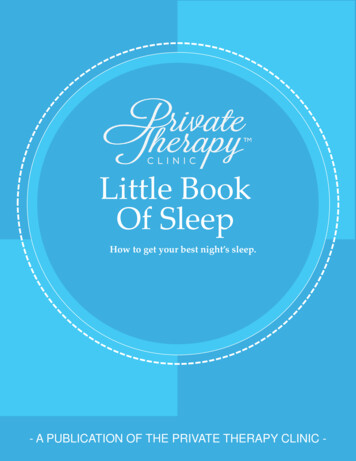
Transcription
Little BookOf SleepHow to get your best night’s sleep.- A PUBLICATION OF THE PRIVATE THERAPY CLINIC -
TABLE OF CONTENTS1Who This Little Book Is For2Do You Have Sleep Problems?3Triggers Of Sleep Problems4Self-Care Solutions5Ask For Help
CHAPTER ONEWho This Little BookIs For
Who This Little Book Is ForA little note from Dr. Becky SpelmanThis is a short guide to the keyideas for getting healthy naturalsleep. Why did I feel it wasimportant to write this? Learninghow to improve your sleep hasincredible benefits including: Better energy Better immune function Better resistance to infection Better concentration & memory Better weight control Better Mental & Physical health Overall improved sense of wellbeingEven aside from understanding all of the many restorative psychologicaland physical qualities of sleep we all viscerally feel the impacts on theclarity of our thinking and our ability to perform at our best when we’ve hada full night of quality sleep versus a broken, short, or absent night’s sleep.There are natural cycles in nature and it is clear that humans do best whenwe work with these cycles rather than staying outside of them or not beingable to benefit from joining in with their rejuvenating cycles.
If you only take one thingaway from this guide Iwould hope to conveythe important of seekinghelp. Books, courses,doctors, sleep experts,do whatever you can toaccess these and startthe conversation as soonas you can. The averagetime it takes a person toseek out professionalhelp whether a doctor ortherapist is around 15years and to me this seems like a small tragedy when it is such a treatableset of symptoms. Often the reluctance is to do with the fear of pills beingoffered as the only solution. As I discuss later this is no longer standard toput forward as the first option, we have other effective tools and strategiesto provide.There are additional symptoms effecting sleep that are not covered in thisguide. Narcolepsy, restless leg, hypersomnia, are just some of the manysleep impacting conditions that can be helped but aren’t covered here dueto the general focus. Again, I’d encourage you to start exploring for help.With sleep especially it is important to remember you are not alone.Insomnia and sleep problems are amongst the most prevalent mentalhealth issues in the world today and affect almost everyone at some point intheir life. It is also one that is overcome by huge numbers of people. Thereare many things that will need to change in your approach if you have beenstruggling with this problem for a long time but getting smart about lookingfor research and answers is the first step so I will do my best to prepare youas you start out on your journey to a life with consistent quality sleep.I hope you take this with the healing intention it was written with.All my best,Dr. Becky Spelman
CHAPTER TWODo You Have SleepProblems?
Do You Have Sleep Problems?There are two spectrums youneedtoconsiderforproblems in the area ofsleep. The first is the type ofproblem you are having andthe second is the level of theproblem or its impact.Firstly, the type of sleepingproblem comes in one ofthree forms:1. Sleep Onset Insomnia. (Difficulty falling asleep.)2. Sleep Maintenance Insomnia. (Difficulty remaining asleep.)3. Non-Restorative Sleep. (Low quality sleep.)There is perhaps a fourth worth pointing out which is Insufficient SleepSyndrome which typically has more of a volitional cause as you find yourselfchoosing to go to bed later or wake up earlier in order to work or manageother life tasks. ‘Choosing’ is used lightly here as modern life does not alwaysallow a lot of choice but it basically means you would have the ability to sleepadequately if circumstances allowed. Just because there is a choice doesn’tmean you should underestimate the impact of compounding sleep debt whichcan be just as severe as chronic insomnia.Secondly, the scale of the problem can significantly change your approachdepending on the severity of your symptoms.
1. Length of time symptoms have been present.2. Length of time it takes to fall or return to sleep.3. Length of total sleep time / stages of sleep completed.4. Restorative quality of sleep (demonstrated in daytime wakefulness,memory function and ability to concentrate).Typically the length of timeyou have suffered sleepproblems should suggest toyou whether you would bewell advised to seekguidance from your localdoctor or a therapist.Insomnia of periods rangingone to two weeks are fairlynormal for everyone toexperience at certain pointsin their life. Periods of morethan two weeks are a signyou should be exploringsolutions and strategies toaddress this.With Sleep Onset Insomniait’s important to realise aperiod of up to 15 minutesfrom going to bed beforefalling asleep is entirelynormal. Indeed, if youregularly fall asleep immediately this may actually point to an excess ofsleep debt resulting in excessive sleepiness when you go to bed. A shortperiod of moving from a relatively awake state to a drowsy state and then tosleep is most typical for healthy sleepers. If you consistently take more than20 minutes to go to sleep then there is definitely some optimisations we’dlook to make and if you take considerably longer than this then a newapproach to sleeping could be incredibly beneficial.
Sleep Maintenance Insomnia can vary from awakening once each night fora short or long time, to awakening multiple times either falling back to sleepquickly or with much difficulty. Awakening once during the night may in factbe entirely normal and there were points in our history where it was morecommon culturally to be awake for a small time in the middle of the night sothere may be a routine that is better to build around this but if you areawake for too long, or wake up repeatedly then there are improvements tobe made.Non-Restorative sleep can be as a result of not being able to fall asleep forthe earlier part of the night or the later part, the earlier typically associatedto deep sleep and the later associated to dream sleep though there are alsocycles within these and both have important benefits to convey.
CHAPTER THREETriggers Of SleepProblems
Triggers Of Sleep ProblemsThere are a variety of noises which can disturb our ability to get a restfulnight’s sleep. This isn’t just limited to literal sound noises either.Noise comes in three distinctcategories.1. Biological – Your body,including food and drink.2. Psychological – Your mind,and what you think.3. Environmental – Your placeof sleep. This includes yourbedroom, the bed, thecurtains, etc.The way to think about noiseis as a stimulus that in itselfisn’t wrong, but its timing is.An environmental example,could be if you’re listening toyour favourite podcast duringthe day then it’s somethingyou enjoy. If your favouritepodcast starts playing at 3amand wakes you up from a deep and pleasant sleep then this is noise. Lights,bed quality, blackout curtains, abrupt noises can all be environmental noise.
A psychological example could be the problem solving you do during yourday. This is key to your success in work and other activities but if this sameproblem solving thinking kicks in when you are starting to fall asleep then itbecomes noise and interferes with sleep. Depression, anxiety, and manyother psychological conditions can also interfere with sleep in this way.A biological example could be a natural feeling of energy and exuberanceduring the day which is incredibly beneficial, but if that same state crops upwhile you are laying in bed trying to drift off to sleep it becomes noise.Stimulants such as caffeine are an synthesised form of this alertness butother causes can be eating large amounts of food or working out vigorouslyshortly before you go to bed.All of these examples, and there are countless more for each, are examplesof where we have to start working on building strategies and supportmechanisms to provide ourselves with a much more straightforward andeasier path towards getting the kind of sleep that we really want.
CHAPTER FOURSelf-Care Solutions
Self-Care Solutions‘Sleep is the golden chain that binds health and our bodiestogether.’- Thomas DekkerThere are two thingsthat create sleep,1. Sufficient levels ofsleepiness.2. Minimal noise.Insomnia is mostoften caused byexcessivenoiserather than a lack ofsleepiness.The key is to address noise then. The best way to approach this is with abroad holistic set of strategies and methods focusing on minimising oreliminating each possible area of noise.People’s typical approach addresses some but not all areas of noise andthis does not go far enough to help sleep as even one area ignored couldbe sufficient to disturb your overall sleep quality of time asleep.There are two periods you need to focus on for a good strategy to support agood night’s sleep.
Firstly, the ultimateaim for creating anatural solution togood sleep is to focuson a good day beingawake.This is composed ofmany things.1. Avoid alcohol,caffeine, andmedication where itis safe to do so.Stimulants are well-known as a problem source for getting to sleep,maintaining sleep, and sleeping with quality. This doesn’t stop many peopletaking too much and too late in the day. There is a huge variation betweenpeople’s sensitivity to caffeine and stimulants with some people able todrink a coffee or eat chocolate straight before going to bed. Most people arenegatively impacted by this and even more will at least have their sleepquality impacted so it’s worth being aware of this when creating a strategyaround good sleep.Alcohol is often cited by people as a solution to help them get to sleep andwhile it can indeed have this effect the quality of the sleep and your abilityto maintain sleep are impacted by this strategy so it is important to avoidalcohol in trying to achieve rejuvenating sleep. It’s also possiblemedications you are taking are impacting your sleep but always consultwith your doctor or practitioner before stopping or changing medicine youtake.2. A healthy diet eaten at the right times and in the correct portions.The quality of what you eat is important. Getting a balanced diet low insugar and processed foods, and high in natural foods with balanced macrosand nutrient dense choices is the ideal. One other thing to bear in mind isthat when and how much you eat is incredibly impactful. Eating largeportions close to bed is highly likely to impact your sleep.
3. Regular exercise.Exercise is important for both energising you during the day when it is bestto do exercise, and also for promoting sleepiness when you get to bed.Depending on the type of exercise it may be best to avoid doingcardiovascular or high-intensity training shortly before sleep. Stretching,yoga, or meditative and slower-paced exercise can be done as part of awind down routine before sleep.4. Learn relaxationandbreathingpractices.It may not sound likethey will do much butthere are few thingsmore effective thanbreathing techniquesfor relaxation andpromoting sleepinesswhile also reducingnoise.Harvard Doctor and author Andrew Weil recommends the 4-7-8 technique.Which can be done whenever you need it in the day to relax both body andmind.Inhale through your nose and close your mouth for 4 seconds. Hold yourbreath for 7 seconds. Exhale through your mouth for 8 seconds. Thenrepeat three more times (so four repetitions total).Another very powerful technique is to just sit and listen to yourself breathingas you lay in bed before sleeping. If you find your mind races with thoughtsconcentrate on both listening to the sound of the inhale and exhale whilecounting each out breath from 1 to 4. Then start from 1 again. You may findyourself counting beyond 4 after you repeat this a few times and your mindbegins to naturally drift.Guided meditations, audio books and relaxing music can also all help in thetransition period between wakefulness and sleep.
4. Ensure a comfortable environment free from noise and stimulus.The checklist includes but is not limited to a comfortable bed but that is firmenough to support your back, along with neck-supporting pillow, cool roomtemperature around 16-18 Celsius or 60-65 Fahrenheit with enough duvetto keep your temperature comfortable, dark/blackout curtains, minimalnoise or steady ambient/white noise or a fan to mask any disruptive noisesthat occur in or around your environment. Eye masks and ear plugs are anoption but be careful to maintain hygiene to keep ears and eyes infectionfree.5.Keeptoaconsistent rhythm forwaking and sleepingtime, and as close tothe natural cycle asyou can.Not all jobs orlifestyles can allowfor this but wherepossible it helps tokeep in tune with thecycles of nature and to sleep during the dark hours of the night and beawake for as much of the daylight hours as possible. Daylight increasedproduction of cortisol in the brain increasing wakefulness, and darknessincreases melatonin production which increases sleepiness. These can beshifted to some degree through environmental control (or things such assupplementary melatonin) but few things beat the natural remedy ofadjusting your schedule to make the most of the natural rhythms of the day.
Let Us Know If We Can HelpWe know how hard it can be taking the first steps tofinding someone you trust to speak to about yourmental health. That’s why we offer a no obligation chatto help you find out where you’re at before committingto anything. Click below to learn more about our:Free 15m ConsultationAlternatively call us on: 44 (0)20 3887 1738OrReach us on WhatsApp: 44 751 111 6565
Who This Little Book Is For Do You Have Sleep Problems? Triggers Of Sleep Problems Self-Care Solutions Ask For Help 2 3 4 1 5. Who This Little Book Is For CHAPTER ONE. Who This Little Book Is For A little note from Dr. Becky Spelman This is a short guide to the key ideas for getting heal
